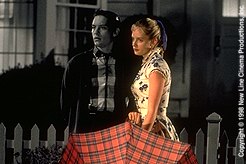PleasantvilleA while back I made a comment that Contact, directed by Forrest Gump lensman Robert Zemeckis, was the best movie Steven Spielberg never did. And now, with Pleasantville, first time director Gary Ross has made the best movie Robert Zemeckis never made. It's a technical marvel, beautifully acted, and its story is far deeper than the ads suggest. The movie starts in the present with two teenage siblings, David (The Ice Storm's Tobey Maguire) and Jenny (the fetching Reese Witherspoon) fighting over the remote to the TV. Jenny, not the most chaste girl on the planet, finally got the school himbo to agree to come over and, um, watch TV. David, meanwhile, was planning on watching the marathon of the 50's TV show Pleasantville. He knows the show backwards and forwards, finding serenity in the show's simplicity by comparison to his troubled life (geek in school, divorced parents, etc.). After the first hour of the marathon is a trivia contest, and David is convinced he's a lock to win. The remote is broken, however, when a tug of war between David and Jenny sends the remote hurtling into the wall. Mysteriously, a TV repairman appears at their door to solve the problem (a hilarious Don Knotts, with the best part he's had in decades). The repairman likes Pleasantville as much as David, and when he realizes David's uncanny working knowledge of the show, he gives him a special remote to replace the broken one. David and Jenny immediately fight over that one as well, and when they hit the wrong button, ZZZZZZZAAPPP!!!!! They're in Pleasantville.
And I'm not talking some Truman Show type Pleasantville, where everyone is a paid actor on a giant set. They're actually in the show, and they've assumed the roles of Pleasantville's main characters Bud and Mary Sue Parker. Both are a little unhappy about it at first, but David starts to enjoy being Bud and urges Jenny to play along so as not to disturb the delicate balance of nature that is Pleasantville. Jenny, on the other hand, is in hell as Mary Sue. This place is way too square, and something's gotta change. That is when things get interesting. See, Pleasantville is filmed in black and white, like all TV in the '50s. But once people start doing things a little differently (Mary Sue and the captain of the basketball team do a little more than hold hands at Lover's Lane, Mary Sue teaches her mother (!) about the birds and the bees), things start appearing in color. A blossom here, a car there, standing in vivid hues while all around them is black, white and gray. Pretty soon people start appearing in full color, and it throws the whole universe out of whack. Why are some people appearing in color while others remain in black and white? I'll let the movie answer that one. But while some embrace this change, others are terrified by it and want things back the way they were. Mr. Parker (William H. Macy, absolutely nailing his role on the head) is completely baffled the day he comes home and finds the house is empty. That's never happened before, and he doesn't like it. Neither does the Mayor Big Bob (JT Walsh, in his last performance), who plans to put an end to this change fast. The theme to Pleasantville is a topic writer/director Ross has dealt with before. He wrote Big, which featured a teenager struggling with acting like an adult. He also wrote Dave, which had an honest man dealing with the inherent corruption of politics. Here, Ross turns that idea on its ear, by sending complex kids into an incredibly simple existence and expanding on the consequences. The main message is clear: Nothing breeds fascism quite like the taste of freedom. (Oh, yeah, that guy who's hovering over Pleasantville? George Orwell) But there is another tune being played here, and that is the one I like the most, which is Simpler is not always Better. And for a first time director, Ross does a phenomenal job handling what must have been a technical nightmare in staging the densely complex special effects shots (they used over three times the shots Titanic used, at one tenth the budget). Ross also got great performances out of nearly everyone. One great surprise was Jeff Daniels as Mr. Johnson, who runs the local malt shop where Bud works. He is the best example of Pleasantville Routine: when Bud came to work late, Mr. Johnson didn't know what to do next since Bud has always been there to do the next step. So he kept wiping the same spot until he wore through the counter. Granted, the second half of the film takes a rather somber turn as the characters find themselves (Joan Allen, as Mrs. Parker, has never shown such warmth and vulnerability, and she's riveting to watch). Some messages come across with a nudge and a wink, while others come with sledgehammers. But I found it easy to tolerate because they played out the racial tensions of the '50s in a way that exposes the sheer idiocy of it all better than anything else I've seen. There were also some clever references to Adam and Eve, To Kill a Mockingbird, and Fahrenheit 451, to name a few. Some people may be turned off from this because it looks like a derivation of The Truman Show, and that would be a shame. I loved Truman, but I heard from many of you regarding its coldness and how underdeveloped a lot of it was. Pleasantville shares nothing with Truman, really, except the concept of television, and Truman does, indeed, look pretty cold by comparison to this. There's nothing quite like looking back to see just how far you've come and how good you've got it, and that's where Pleasantville excels.
|

